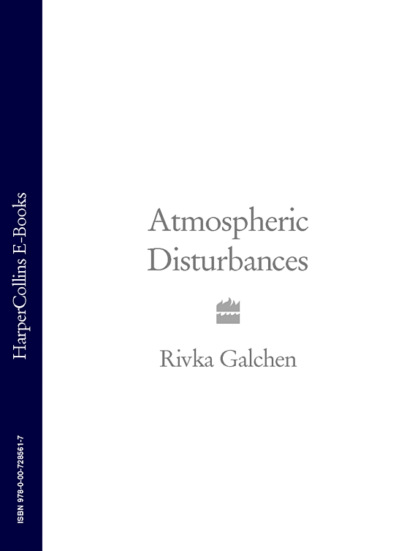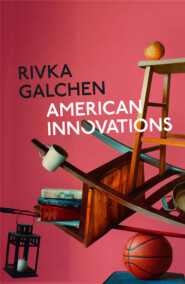По всем вопросам обращайтесь на: info@litportal.ru
(©) 2003-2024.
✖
Atmospheric Disturbances
Настройки чтения
Размер шрифта
Высота строк
Поля
I caught tinted sight of my slouched figure in the reflection of that observation glass that separated the staff from the patients. I noticed—remembered—that I was carrying Rema’s pale blue purse. “Yes,” I said, straightening my back, “I am.”
He guffed one violent guffaw.
But there was no reason to be laughing.
His Rema-esque vein pulsed unappealingly across the characterless creaminess of his skin. “I didn’t know you worked nights,” he said. “I didn’t know if—”
I should explain now that ever since I’d gotten Rema a job working as a translator at the hospital, I’d come to understand—from various interactions with people I didn’t really know—that many of Rema’s coworkers were extremely fond of her. She does often manage to give people the impression that she loves them in a very personal and significant way; I must admit I find it pretty tiresome dealing with all her pathetic devotees who think they play a much larger role in her life than they actually do; I mean, she hardly mentions these people to me; yet they think they’re so important to her; if the night nurse—apparently a member of Rema’s “ranks”—weren’t so obviously barely more than a child, then I might have wondered if he could help me, if I should ask him something, if he might have knowledge of the circumstances behind Rema’s absence, behind her replacement, but I could divine—I just could—that there was nothing—nothing at all—to be learned from that man.
“We probably did take his leg,” I said. On the night nurse’s desk lay the patient’s chart, open. Glancing at the intake page I had noticed the high sugar.
“What’s that?” the nurse said, still staring at me, but as if he hadn’t heard me.
“I mean, the funny thing is that, literally speaking, doctors probably did take that poor man’s leg,” I answered, explaining myself in perhaps a slightly raised voice. “We say amputated, he says stolen”—I was getting my voice back under my own control—“but that’s not psychosis. That’s just poor communication.”
A beat went by and then the nurse just shrugged. “Okay. Well. Not exactly the irony of ironies around here.” He turned back to his monitor.
“You shouldn’t be sloppy with the label ‘psychotic,’” I said. Just because a man’s in foam slippers, I almost continued lecturing to his back. But as I felt an inchoate anger rising in me, an image came to my mind, of that nervous puppy the simulacrum had come home with, of the puppy’s startled look of the starved, and I remembered that I had other anxieties to which I had intended to be attending.
Even if the unidentified patient wasn’t mine, wasn’t Harvey—as long as I was at the hospital, I thought I should look through Harvey’s old files. Maybe there would be clues as to where he might have gone; Rema would have liked to see me pursuing that mystery. And a part of me clung to the hope that if I dallied long enough, then by the time I made it back home Rema would be there, maybe battling it out with the simulacrum, as if in a video game. Rema would be victorious over her other and then together Rema and I would set out (the next level, another world) in search of Harvey.
That, anyway, was the resolution that presented itself to me.
“I’ll be in the back office,” I announced, feeling, I admit, a bit unbalanced, a bit homuncular, and beginning to develop the headache that had earlier, unexpectedly, and without my even noticing, ebbed.
I did call up Harvey’s old records, and I sifted through them, though I could detect no trends. But as I sat there, one Rema clue—or false clue—recalled itself to me. It was this: A mentor of mine from medical school had recently been in town. He had always been a “connoisseur” of women—this pose of his had always irritated, he had in fact once “stolen” a woman from me—nevertheless I admired him for other reasons and had been eager to have him meet my Rema. I had steeled myself against the inevitable jealousy of watching him chat her up—and I’d held my tongue when Rema put on a fitted, demurely sexy 1940s secretary style of dress—but then, all my mental preparations were for naught. Strangely, my mentor hadn’t seemed much charmed by Rema. He’d behaved toward her with serviceable politeness but nothing more. It was odd. At one point he’d made a joke about the election and Rema hadn’t followed. Maybe for a moment I wasn’t charmed by Rema. As if she weren’t really my Rema. My Rema who makes everyone fall in love. Case: the night nurse.
But back then it really was still her—I’m almost sure of it.
3. What may be highly relevant
I have mentioned my patient Harvey, but I have failed to properly discuss him and the odd coincidence, or almost co-incidence, of his having vanished just two days before Rema did. So, actually, most likely not a “coincidence.” In retrospect I feel confident that the seeds of tragedy were sown in what I had originally misperceived as a (kind of) light comedy of errors.
a. A secret agent for the Royal Academy of Meteorology
When I first met Harvey just over two years ago, he was twenty-six years old, and for nine years had carried a diagnosis of schizo-typal personality disorder. He lived at home with his mother, had been treated successively, though never (according to his mother) successfully, by eleven different psychiatrists, two Reichian psychotherapists, three acupuncturists, a witch, and a lifestyle coach. Additionally Harvey had a history of heavy alcohol use, with a penchant for absinthe, which lent him a certain air of declining, almost cartoonish, aristocracy.
Harvey’s mother had called me after reading an article of mine peripherally about R. D. Laing. In my unintentionally lengthy conversation with her, with me practically pinned against the wall of some insufferably track-lit Upper East Side coffee shop whose coffee, she kept insisting, was “superior,” I quickly came to understand that she had grossly misread my paper. (For example, she interpreted my quoting Laing on “ontological insecurity” and “the shamanic journey” as endorsement rather than derision.) But I didn’t try to set right her misreading—that would have been rude—and I found the case of her son interesting. I could imagine entertaining Rema with its details. Also: it pleased me, the thought of telling Rema that a woman had sought me out after reading an article of mine.
Functionally speaking, Harvey’s main problem—or some might say his “conflict with the consensus view of reality”—stemmed from a fixed magical belief that he had special skills for controlling weather phenomena, and that he was, consequently, employed as a secret agent for the Royal Academy of Meteorology, an institute whose existence a consensus view of reality actually would (and this surprised me at the time) affirm. According to Harvey, the Royal Academy dedicated itself to maintaining weather’s elements of unpredictability and randomness.
“I would have thought the opposite,” I said in our initial conversation.
“Everything we say here is secret?” Harvey asked.
I assured him.
He explained: Opposed to the Royal Academy of Meteorology was an underground group known as the 49 Quantum Fathers (not confirmable as existent by a consensus view of reality). The 49 ran self-interested meteorological experiments, in uncountable parallelly processing worlds, and it financed itself through investments in crop futures, crops whose futures, naturally, depended upon the 49’s machinations of the weather.
I asked Harvey to clarify, about the parallelly processing worlds.
“Yes, well, the Fathers can move between the possible worlds,” he said. “Like they can go to the world that is like this one but Pompeii erupts ten years later. Variables are altered. Like maybe in one of those other worlds you were hit by a produce truck when you were a kid and we aren’t talking here now.”
Perhaps my pressing irritated him.
He continued, “In one world it’s a rainy spring in Oklahoma, in another world it’s a drought,” though I don’t know if he was aware of himself trying to mitigate an aggression. “Normally the worlds remain isolated from one another, but there are tangencies that the 49 exploit, for muling data and energy from one world to another. I do wonder how they map them—that I don’t know. You understand, of course, that knowing the weather means winning a war, that all weather research is really just war research by other means.”
I didn’t really know that, but I later read up on the topic on my own, and although one might argue that he was exaggerating, he was—even by a consensus view—off only in a matter of degree, not of kind.
“But,” Harvey said, “I don’t mean to aggrandize my personal work. I’m just the littlest butterfly. I handle mostly mesoscale events; I specialize mostly in local wind patterns.”
The Royal Academy sent Harvey orders through Page Six of the New York Post; it wasn’t that he saw text or images that weren’t actually there; rather, he understood what was there as encrypted messages expressly for him. Early rumors of J. Lo’s divorce had, for example, sent Harvey nearby to the Bronx, but often these orders—coded in a Hasselhoff binge or a Gisele Bündchen real estate acquisition—entailed Harvey setting off unannounced on missions across the country. Harvey’s mom would learn of his whereabouts only days later when she’d receive a call from a distant ER or police station. Harvey’s homecomings were often notable for cuts and bruises he could not explain, occasionally even signs of severe nutritional deficits, once including cerebellar dysfunction.
When asked about his absences, Harvey’s elucidation tended to go no further than to say that he was “laboring atmospherically.”
Arguably these disappearances actually endangered his life.
“From the moment I shook your hand,” Harvey’s mother said to me in her wet-eyed, well-wardrobed way, “I could just tell that you were different from the rest, that you were superior, that you would be the one to solve everything.” She said this after my first meeting with her son.
Well, looking through Harvey’s files, I saw that in the past medications had been thrown at him but, not surprisingly, to no avail. As far as I could ascertain, apart from his ideas of reference, he had no auditory or visual hallucinations and no compelling mood symptoms, so it was rather unclear what the medications would have been targeting.
In my next several meetings with Harvey, I tried to engage him in some reality testing. I asked him if he’d ever met anyone else who worked as a secret agent for the Royal Academy of Meteorology. I asked him how he had acquired his special powers for manipulating the weather.
He told me that his father had been a top agent for the Academy. He told me that his father had single-handedly prevented a major hurricane off the Gulf of Mexico meant to knock out an entire mango crop. That, Harvey explained to me, was why the 49 Quantum Fathers had abducted his father many years ago, stashed him away in a parallel world.
I chose not to pursue the father issue further.
I did make a few other efforts to gently instill in Harvey some creative doubt in the internal perceptions of his world—such doubt being the usual cornerstone of delusional treatment and the path back to the consensus view of reality. But I failed. My failure did not hugely surprise me. Reality testing is notoriously unsuccessful for schizotypals, and if taken too far—and too far is not that far—it will serve only to isolate the patient further and deepen his conviction that he alone understands reality. Then a downward spiral begins.
The day immediately following my fifth session with Harvey, he again went missing. Nine days later he turned up in a hospital in Omaha. There had been hailstorms.
b. An initial deception
I should explain about the lying.
It was Rema who suggested that I lie to Harvey. I did not come up with that idea by myself. “That you lie como una terapia,” she emphasized. “You lie, but it is to benefit another. So it is a lie that is ethical. Isn’t that fine? Didn’t you tell me they used to hold the heads of disturbed patients underwater for the time it took to recite the Miserere? This treatment would be much nicer than that, this small lie carrying good intentions.”
Rema began then, completely impromptu (and this is a perfect example of the kind of Rema-ness absent in her impostress), to propose and elaborate upon a scheme wherein I was to pretend that I—like Harvey—was a secret agent of the actually existent Royal Academy of Meteorology. But that I—unlike Harvey—was an agent of superior rank. Who was in touch with an agent of even more superior rank. “Psychotics very much respect ranking,” she announced authoritatively.
“Yes, so does Harvey’s mother,” I added, not meaning to sound encouraging.
Rema paused and then added: “I’ll call. I’ll call to your office and you respond the phone and you listen very seriously and pass on the instructions that you will supposedly be receiving from a senior-ranking meteorologist. From me.” Rema particularly liked that detail, of her being the senior-ranking meteorologist.
The instructions, primarily, would be that Harvey “labor atmospherically” at locations very close to his home. On street corners. In the park. Handling very important mesoscale phenomena in the greater New York City environs.
I remember, strangely, that Rema was eating kumquats as she explained this plan to me. The kumquats still had leaves on them, which made the orange especially vibrant. And within me, as I listened to Rema inventing, as I watched her thinking through an elaborate lie, an alarm was sounding. But all my life, so many alarms seem always to be sounding, and so it becomes near impossible ever to say what any particular alarm might be signaling, or what might have set it off, or if it in any way ought to be heeded. The alarm then could as likely have signaled simply the color of the kumquat—some perhaps atavistic and now obsolete warning of poison—as something more grave.
“Not only is it unethical,” I said to Rema, “but your idea won’t even work. Why should it? And if Harvey discovers the lie—well, then it’s all over. The therapeutic relationship: over.” And possibly my career as well, I didn’t say.









